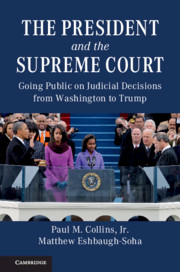Book contents
- The President and the Supreme Court: Going Public on Judicial Decisions from Washington to Trump
- The President and the Supreme Court: Going Public on Judicial Decisions from Washington to Trump
- Copyright page
- Dedication
- Contents
- Figures
- Tables
- Preface
- 1 Going Public and the Supreme Court
- 2 Going Public on Pending Decisions
- 3 Going Public on Decided Cases
- 4 The Tone of Presidential Rhetoric on Supreme Court Decisions
- 5 Presidential Calls to Congress
- 6 Presidential Leadership of News Coverage
- 7 Presidents and Public Opinion
- 8 Going Public on Supreme Court Cases before the Modern Presidency
- 9 Conclusions
- Notes
- References
- Index
9 - Conclusions
Published online by Cambridge University Press: 13 December 2019
- The President and the Supreme Court: Going Public on Judicial Decisions from Washington to Trump
- The President and the Supreme Court: Going Public on Judicial Decisions from Washington to Trump
- Copyright page
- Dedication
- Contents
- Figures
- Tables
- Preface
- 1 Going Public and the Supreme Court
- 2 Going Public on Pending Decisions
- 3 Going Public on Decided Cases
- 4 The Tone of Presidential Rhetoric on Supreme Court Decisions
- 5 Presidential Calls to Congress
- 6 Presidential Leadership of News Coverage
- 7 Presidents and Public Opinion
- 8 Going Public on Supreme Court Cases before the Modern Presidency
- 9 Conclusions
- Notes
- References
- Index
Summary
We conclude the book in Chapter 9. We begin by presenting data on the first 21.5 months of the Trump Administration and situate that information in light of our findings with regard to previous presidents as a way of bringing our empirical conclusions to life. We find that President Trump’s remarks on the Court’s cases are similar to previous presidents in many ways, but his rhetoric toward courts as institutions and lower-court judges is more vitriolic than his predecessors. We then review our key findings with regard to normative theoretical debates about judicial independence and the coordinate construction of the Constitution, and discuss their contributions to the study of the rhetorical presidency. We ultimately conclude that taking positions on Supreme Court decisions is a perfectly appropriate presidential governance strategy. We close by offering suggestions for future research on the important subject of executive-judicial relations in the US and across the globe.
Keywords
- Type
- Chapter
- Information
- The President and the Supreme CourtGoing Public on Judicial Decisions from Washington to Trump, pp. 204 - 222Publisher: Cambridge University PressPrint publication year: 2020

